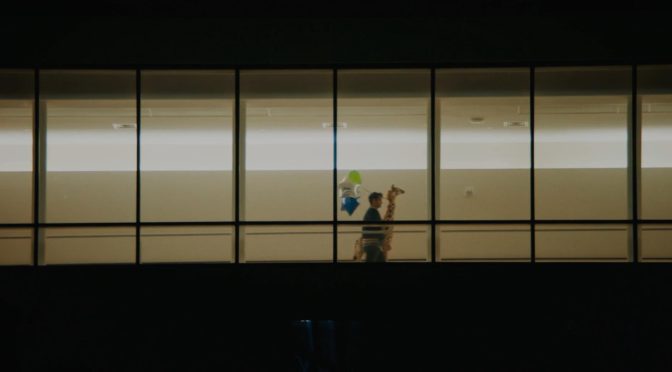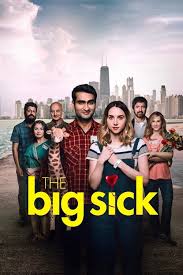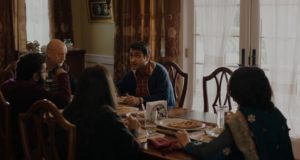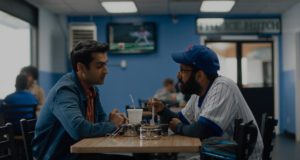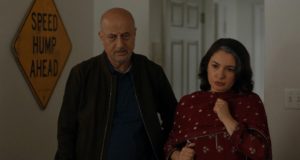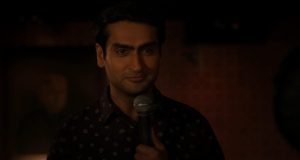The Big Sick is not a Judd Apatow film in the strictest sense. The film’s director is Michael Showalter, a writer, director and performer who came up on the 90’s sketch show The State (MTV’s very funny answer to Kids In the Hall), helped form the well-regarded Stella comedy trio, and has now directed a few features, including the creatively premised but middling romantic comedy The Baxter and 2015’s mildly well-reviewed Sally Fields dramedy Hello My Name Is Doris. The film’s credited screenwriters are two married comedians, Kumail Nanjiani (Silicon Valley) and Emily V. Gordon (a comedy writer and pop culture podcaster), and the story itself is an account of the early days of their relationship. The Big Sick is only an Apatow in the sense that Apatow acted as a mentor when Gordon and Nanjiani were fine-tuning the script and his production company, Apatow Productions, provided the financing. But, while Judd Apatow is probably not even the fourth person I would credit The Big Sick to, I am going to have to begin my review by talking about Judd Apatow. The reason for that is that The Big Sick fits so snugly into the wheelhouse of what the best Apatow films do well. At the risk of coming off like some kind of stunted, nerdy bro, The 40 Year-Old Virgin was a formative comedy experience for me. For context, I was 23 years old and there are few things more quintessentially Apatowian (Apatovian?) than having a formative experience at a stoner sexy comedy when you are old enough to have a spouse and a full-time job. But in all seriousness, the bracing mixture of human warmth and bawdy comedy moved me then and still does. When I was a teenager, the sex comedy was most visibly represented by the mean-spirited hijinks of the American Pie franchise and the copycats it inspired. These movies ostensibly had protagonists that we were mean to root for, but the aim always seemed more to see them go through a gauntlet of dumb humiliations. And I don’t want to be too harsh on dumb comedy here, because I can watch a good Farrelly Brothers (a good one, mind you) any day of the week. But I always felt that the American Pie’s of the world were just had cruel little souls. For all that Jim was the hero of American Pie, I never felt like his own film liked him all that much. Even as an awkward, sexually inexperienced teenager myself, I could not imagine actually identifying with Jim or wanting the best for him. The film’s sneering sense of mockery seemed to discourage anything resembling empathy. Having grown up with those films in the mainstream, The 40 Year-Old Virgin, Knocked Up, and Superbad were like fresh oxygen to this sensitive, humanism-loving movie buff. And now that maybe a little bit of the bloom has fallen from the Apatow rose and we’ve weathered our first patch of Seth Rogen fatigue, I have to defend what films like The 40 Year-Old Virgin meant, and still mean, to me. The idea that uproarious, profane, sexually frank films can be sweet and driven by empathy is a notion worth holding on to. That you can even have a character experience a funny bit of humiliation and still laugh with them because the character is given dignity, intelligence, and an awareness of their own ridiculous situation. Whatever quarrels one might have with the Apatow comedies, I maintain that they are comedies that genuinely like humankind and that matters tremendously to me. It means a lot to me as someone who just likes to see kind, relatable human beings in films. It also means a lot to me as someone who values sex-positivity, because having bawdy sex comedies with generous spirits allows us to laugh about sex in a way that is honest and curious rather than just crass. Most of all, I am in love with any film that can be both uproariously funny about the foibles and misunderstandings of human coupling and still genuinely want the best for those people.

All of that is to say, while giving credit to Showalter and especially Gordon and Nanjiani, that The Big Sick is the best kind of Apatow film. It not only hits comedic highs that are worthy of comparison with the funniest moments of Knocked Up and Superbad, but also manages to hit dramatic depths that are deeper than any of its Apatow predecessors have reached. The Big Sick is the true story of the courtship of Emily Gordon and Kumail Nanjiani, who met in 2006 at a Chicago standup comedy club where Nanjiani was performing a five-minute set. Gordon (who was completing her Masters to become a therapist at the time) shouts a supportive “woohoo!”, which gives Nanjiani an excuse to approach her at the bar under the guise of correcting her. He explains that heckles are heckles, even when done with positive intent, and the two are soon engaged in deep conversation about their plans and aspirations. They eventually go back to Kumail’s place to have sex and ignore Night of the Living Dead and they end the night intending to not get too serious. However, after proposing not to see each other again too soon, the two quickly fall into a pattern of spending every waking moment together, and before long they are in love. Soon after, however, their relationship has to withstand two potentially catastrophic obstacles. First, Nanjiani has serious trepidations about telling his strict Pakistani parents (played very well by Anupam Kher and Zenobia Shroff), who insist he marry within a Pakistani woman like his brother Naveed (Adeel Akhtar in a funny and subdued performance). His mother is particularly insistent, regularly inviting young Pakistani women to “drop by” during family meals so they can meet Kumail and give him their photographs. This leads to disaster when Emily discovers the photographs and consequently learns the even more hurtful fact that Kumail has been hiding their relationship from his parents. As a result, Kumail and Emily end up having a very turbulent breakup and Kumail is resigned to the fact that he will probably never see Emily again. The second obstacle comes shortly thereafter when Kumail receives a call from one of Emily’s grad school classmates alerting him that Emily has come down with what appears to be a very nasty case of influenza and has been placed in the emergency room. Kumail arrives to check on her, only expecting to stay until a friend or family member can take his place. As fate would have it, he ends up being the only person present when the doctors come to a sobering discovery. Emily’s flu has turned into something far more serious, a mysterious infection in her lungs, and she will have to be put into a medically induced coma until they can figure out her ailment. One of Emily’s physicians urges Kumail to say that he is her husband so that they can sign off on the procedure before it is too late. Kumail agrees to sign off, calls Emily’s parents, Terry and Beth, to tell them the news, and then stays until they arrive. When he awakes to find them standing by Emily’s bedside, it is immediately clear that they know this is the young man who broke their daughter’s heart. As Kumail introduces himself, Beth (Holly Hunter, in a performance that juggles fiery anguish, caustic wit, and maternal warmth) tells him tersely, “We know who you are, Kumail.”. Nonetheless, Kumail stays with the Gordons long enough to learn more about Emily’s prognosis, until the genially awkward Terry (a hilarious, utterly revelatory performance by Ray Romano) makes it clear that he can go. Kumail initially does leave, but comes back moved by the feelings he still has for Emily and gripped by a desire to atone for the hurt his dishonesty and cowardice caused. So, after starting as a lovely, sweet, and eventually heartbreaking story of romance found and lost, The Big Sick becomes a different kind of relationship story: the nuanced, overwhelmingly poignant story of a man almost losing his new love to death and going through a harrowing experience with her parents. As that is happening, Kumail is trying to find the strength to come clean with his stern, traditional family about his aspirations to pursue a career in comedy and the fact that he is in love with a white woman. I could say more about the plot, but The Big Sick really is about getting to know these characters (none of them less than very well-acted) and being overwhelmed by the depths of its deeply felt humor and humanity. As with all the great Apatow films, the secret sauce here is a kind of improvised, non-programmatic direction. Scenes don’t simply perform their function and end, but malinger a bit to let the moments and characters breathe. I have personally always liked this loose, shaggy quality , but I do not begrudge anyone who feels the Apatow films could benefit from a bit more economy. That said, if you found Knocked Up too meandering, you will at least be pleased to find that The Big Sick is almost certainly the most focused film to have the Apatow name attached to it, all thanks to its doozy of a central concept. Having an actual matter of life and death at the center of this kind of comedy has a galvanizing effect on the usual loose-limbed, gangly humor. The pathos makes the film feel urgent and immediate even in its most hilariously digressive moments, and the frequent laughs come like sweet, cool breezes of relief in the face of the anxiety and dread that the main characters are coping with. And because this is clearly a film more driven by its plot and its jokes than by anything you could call thematically heady (a Judd Apatow essay film is something we will all just have to keep waiting for), I must proclaim that The Big Sick really is just a terrific story. It has the kind of joyful, unfussy plot that has the good sense not to get in its own way.


Then again, I just wouldn’t be true to my nature if I didn’t point out a theme or two, and The Big Sick wouldn’t be such an unexpectedly moving addition to the romantic comedy genre if it didn’t have some real thoughts on its mind. One way that The Big Sick adds even more resonance to an already powerful plot is by seamlessly folding in one of the most moving, well-observed looks at the experience of being an immigrant in America. Kumail’s identity as the son of Pakistani parents has a tremendous impact on the plot of the film, while also being intrinsically valuable as a lovingly candid window into his culture. Apatow himself has said that he, Nanjiani, Gordon, and Showalter all felt a lot of good would come just from the simple act of placing a Pakistani immigrant family on screen and just letting them be funny and human. The Big Sick touches on what it means to be Middle Eastern in our current American climate, and if it is not a searing indictment of xenophobia, it achieves something powerful just by allowing Kumail Nanjiani (a terrifically funny and gently disarming comedic presence) to tell a story with great, fully developed Pakistani-American characters. It is quite positive enough just to give voice and a moving narrative to a culture we do not often see on screens. But as with everything else in The Big Sick, the moving and the funny are very much in sync. The most heartening fact to me is that we now have a splendid comedy where Pakistani culture plays a pivotal role. The benefit of making a blissfully funny comedy about an underseen culture is that great comedy has a unique capacity to knock down irrational phobias and ignorance. Nanjiani’s approach, both as a comedian and now a screenwriter, is to use his humble, self-effacing, and gently mocking comedic voice to simultaneously zero in on the peculiarities of his cultural back ground and to brush away the mystery and misconceptions surrounding it. I am happy for any film that gives us a view into another culture’s customs and unique social mores, but I am especially glad that this year gave me the chance to learn about a marginalized culture through a comedy this consistently side-splitting and humane. Once you have laughed, not simply at but with characters from a different culture, it becomes all the more difficult to think of them in an otherized way. As with so many Apatowian comedies, I left The Big Sick having gotten to know a whole host of relatable, fallible, spontaneous, funny people, but this time four of those people were lovingly drawn, well-observed characters of Pakistani descent and I cannot overstate the value of that basic act of representation. When it was over, I felt I knew an entire family of idiosyncratic, prickly, unique individuals with distinct personalities and aspirations. And even if you happen to be one of those filmgoers who think that the Apatow comedies meander and spend too much time just hanging out, I hope you will forgive that indulgence in this one case. Hollywood invites people like the Nanjianis to just hang out much too rarely.
The Big Sick is not only an observant look at a Pakistani family, but something of a sweet love letter to family in general. One of my favorite things about the narrative structure of this film is how it spends well over running time not on the dating between the two main characters, but on the interactions between Kumail and Emily’s parents. In a way, one could argue the main romance of the film really is the one that develops between Kumail and the new family he realizes, almost too late, that he wants to be a part of. The interplay between Nanjiani, Hunter, and Romano is a subtle master class of humor, tension, worried fatigue, and guarded hope, all butting up beautifully against one another. While Emily is conscious, Kumail is constantly balking at the prospect of meeting Emily’s parents, worried that he will then have to reveal her to his own family. And you can chalk this up to the fact that it really happened, but it adds a poignant dimension to the film that he ended up finally meeting them in this peculiar way, in these harrowing circumstances. So The Big Sick really is two romances: a sweet love story between a man and a woman and an entirely different kind of love story between that same man and his paramour’s family. It is about coming to love someone more through learning about the people who raised them. And while The Big Sick is too light on its feet to belabor or underline this point, the wide shadow of parents and family is a consistent emotional motif. The film becomes a beautiful meditation on the conflicting emotions that family brings out. The need to love our parents, repay their sacrifice, and also find a way to define ourselves outside of them. And what makes The Big Sick such a smartly plotted film is how the interactions with Emily’s parents, which Kumail conceals from his own family, give him insights in how to think about and interact with his own mother and father. It is through spending time with Beth and Terry that Kumail starts to see his parents with more dimension than he once did. During a night of bonding. as Kumail and Emily’s parents fight off their dread with bottles of wine, Beth explains to him how her North Carolina family hated her now-husband for many years. Kumail doesn’t tell Beth his fear that his own mother will disown him over loving Emily, but he asks her how she got over that familial obstacle. How did she make it work? “Lots of fucked up dinners,” she replies in that perfectly tart, winningly direct Holly Hunter way. This conversation plants the seed of Kumail’s growing courage to own up to his love for Emily. It stokes the grit to rebel against his parents. But the same conversation also makes him reflect on his love for them. As Beth talks about how she and Terry fell in love, Kumail realizes that he never found out what movie his mother and father saw on their first date. It was a question he had somehow never thought to ask them. Kumail starts out nervous and afraid of the Gordons; first fearful to meet them and then ashamed for hurting their daughter. But the lovely arc of the film is his decision to summon some trace amount of courage and stay with them through the ordeal; to own up to the hurt he caused Emily but to also assert himself. In finding the will to speak plainly to the Gordons and to also listen to them, he learns something valuable about parents. They are not crutches to depend on, nor tyrants to grovel before, nor ogres to be feared. Parents are just people and, even when they don’t see eye to eye with you, the right thing to do is to love them, listen to them, and also be yourself. To proceed stalwartly on your own journey, while also having empathy and curiosity for where their journeys have taken them.
And if there’s a third message to be gleaned in this delightfully funny film, I think it’s just about basic courage. And honesty. And standing up for one’s choices. If you group all those ideals together, I think what you end up with is that word so beloved by my late grandfather: gumption. It could scarcely be an Apatowian comedy, if a character didn’t have to stare down his growing pains and make the hard, fruitful decision to grow and change into their own version of an adult. And when I look at this wooly, lovable dramedy through the lens of gumption, it does start to attain its own shaggy kind of thematic coherence. Moving to a new country or a new city, committing to our first serious relationship and forming new bonds with our loved one’s loved ones, and redrawing old boundaries with the people who have known us all our lives. They all require self-determination, self-belief, and the summoning of our will power. They are what you need if you want to build a new life, and I really do think The Big Sick is about the first steps people take toward building a new life for themselves. To do so, we must make ourselves understand and believe that the pains of changing will be outweighed by the rewards to come. And if growth, change, maturity, and committing to a new course are all common tropes in the Apatow canon, I am not sure they have ever felt so thoughtfully reflected in every atom of the narrative as they have here. I must reiterate that The Big Sick is a consistently hilarious comedy before it is any kind of rigorous examination of stasis and transformation. But when I was done laughing until my sides hurt, what kept me warm for days afterwards was recalling how many kind-spirited, generous, and honest lessons this film offers about doing the right thing.
What I love most about The Big Sick probably just comes down to how lovely its tone is. Michael Showalter is not a director of any remarkable pyrotechnic skill. There is nothing remotely flashy in the film’s approach, and if I were judging on direction and editing alone, The Big Sick would not be anywhere near this high on my year-end list. But while it may lack anything formally impressive, The Big Sick is a film with a rather wonderful, understated sense of tone. It is the kind of tone that can have you feeling genuine pangs of sadness and concern for a character at the same time that you are audibly howling at the world’s best 9/11 joke. And for as much as I try to celebrate films that push the needle forward visually, sonically, and ideologically, there are also films that achieve their power through an invisible emotional undercurrent. When you get a film that can combine a wide gamut of emotions and make that blend feel seamless and intuitive, that is something special. To me, it is a skill every bit as worthy of praise as capturing a difficult shot or editing together a perfectly propulsive montage. I turned off The Big Sick with the deepest affection for all of its characters. I had experienced elation, dread, and sorrow. I had learned about a different culture and thought about the bonds of family. I had felt rich laughter rippling around uneasy knots in my stomach. And to me that is a magic trick all the more satisfying confounding for not being easy to visually identify. Like the very best films I saw this year, The Big Sick served me an impeccably mixed cocktail of humor, pathos, cultural insight, and conflict. It was a sweet beverage with subtle bitter notes and it sent me tripping back into the world with a damp, happy face. I stood in the warm, fading sunlight, buzzed, giddy, and ready to fall in love with humanity all over again.
